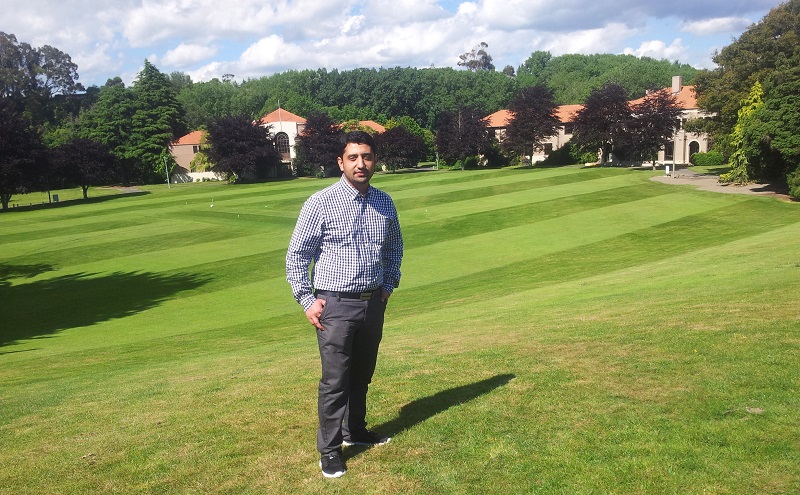 Asmat Halimi at Massey University
Asmat Halimi at Massey University
Journeys of Despair, Journeys of Hope
It was late evening of August 19, 2021, after days of chaos and terror, days of tens of thousands of people rushing to the airport to escape, days of trying and failing, again and again, to evacuate. There was gunfire, bombs exploding, people running and screaming, and people dying. The only thing Asmatullah Halimi carried with him when he evacuated from Afghanistan to Australia was his laptop full of cherished memories of Massey University.
“It was a chaotic situation with everyone in the city rushing towards the airport. I couldn’t find a chance to get to the airport for three days. And on the fourth day at 9 pm, the Australian Defence Force helped me get to the airport with my wife and four kids, and then they took us to Australia.”
Be equipped with knowledge
Asmat, a Massey alumnus, has come a long way to make his dreams come true and give back to his country and people. He was born in 1986 in Nangarhar province of Afghanistan. Soon after a fun and memorable time of life, like most other Afghans, Asmat’s family migrated to Pakistan in 1989.
There was fortune in misfortune in that period – being born into an educated family was the luckiest start to Asmat’s life. He and his four brothers and three sisters were all educated as their father was a university lecturer and his children’s education was a priority for him. Asmat finished his primary and secondary school in Pakistan and returned to Afghanistan in 2001.
Though cultural differences made it difficult to explore his cultural identity and find belonging when Asmat initially returned to his own country, he never stopped learning and continued to develop in-depth knowledge. In 2009, he gained his Doctor of Veterinary Medicine (DVM) degree from the Faculty of Veterinary Science of Kabul University. Asmat utilized that knowledge as a veterinarian for two years before he worked as the Program Officer with the Embassy of Japan in Afghanistan in 2014.
Being a big fan of cricket, Asmat was so obsessed with New Zealand’s cricket team that he always looked online at the beauty of this country and always wished to visit Aotearoa. With a lucky chance and ongoing efforts, Asmat completed the Master of Veterinary Studies (One Health Epidemiology/Biosecurity) and One Health Epidemiology Fellowship Program from Massey University in 2016. For him, the journey (2014–2016) with Massey was terrific, and it was a dream come true to complete his master’s at a highly reputed academic institution.
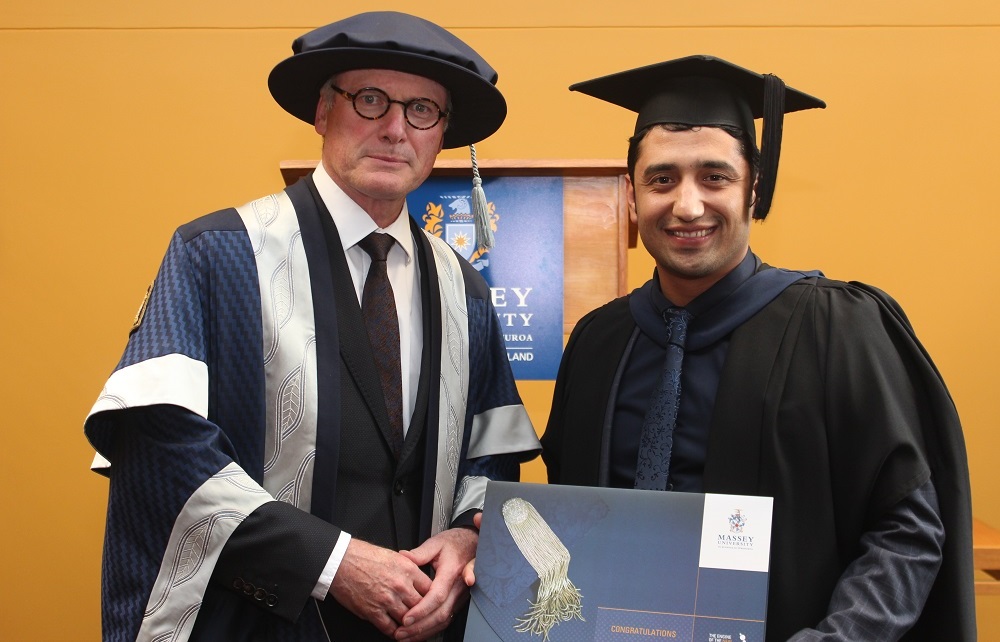 Graduation with then VC, Steve Maharey
Graduation with then VC, Steve Maharey
“My journey with Massey was a miracle! I remember the day – I was working at the office, and a friend came to me saying there was an opportunity for a scholarship for a master’s degree at Massey. There was only one day left to apply. I was so surprised because I had been looking for everything, but I had missed it.
I was shocked and thrilled and left the office immediately, got back home, and grabbed all the documents – but it was too late that day. Unfortunately, the next day was Friday – a weekend in Kabul, where everything was closed. I couldn’t find any place to scan those documents and have full internet access to submit my application. Finally, I asked my manager if I would be allowed to come into the office during an off day. Luckily, I made it!”
Dream big, and dreams come true
“I always had an inner feeling to gain a credible education, and that’s how I ended up at Massey.”
This two-year fellowship program allowed Asmat to pursue a full-time postgraduate education and training program in human, domestic, and wildlife health; it gave him memorable moments with Massey. Asmat believes that Massey brought enormous change in his professional and personal life with the continuous guidance provided by supportive, intellectual, and encouraging lecturers. Massey’s degree added value to his career and the chances of getting a job in Afghanistan.
Asmat shares that Massey University’s program was not only a learning process but also provided him opportunities to build national and international professional connections. He represented his country on several national and international platforms, including economic policy analysis workshops in Bhutan, Thailand, India, Nepal, and Bangladesh and the One Health EcoHealth Congress in Melbourne in 2016.
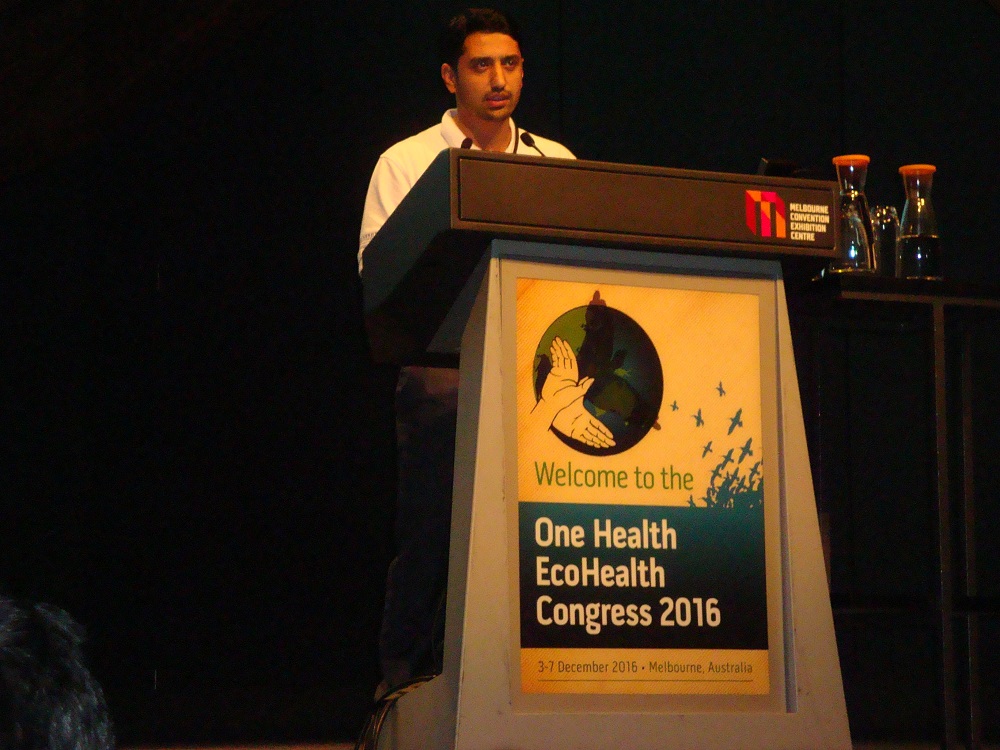 One Health EcoHealth Congress in Melbourne
One Health EcoHealth Congress in Melbourne
“I want to revisit Massey University and remember those nice memories, especially the day of my graduation,” says Asmat.
Having a passion and hope for his country, Asmat returned to Afghanistan after participating in the graduation ceremony at the Manawatū campus. He joined the development and humanitarian sector, aiming to serve his people through the knowledge and experience he had accumulated. He was selected for a role at the Japanese Embassy in Kabul in 2017 as Program Officer. And then, he received another offer from the Australian Embassy in 2020 in Kabul and worked as Development Officer under the development portfolio.
“Working for the Japanese and Australian embassy also served my people and country. All programs we engaged in were to promote the development of Afghanistan and support those who have been victims of this war for the past several decades,” says Asmat.
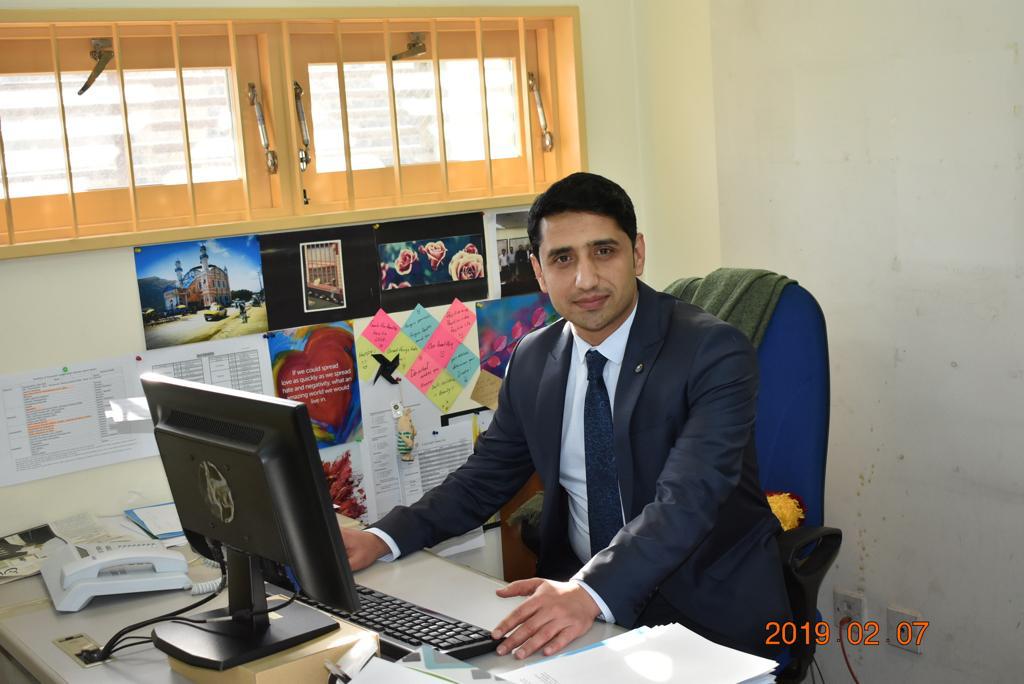 My office at Japanese Embassy Kabul
My office at Japanese Embassy Kabul
Left my heart in Afghanistan
The situation was getting worse – there were almost one or two explosions daily in the main cities. “Big explosions were in front of me, and I just missed one within seconds from the explosion sites when traveling to work, which was big trouble for me working in Afghanistan. I still had a passion and enthusiasm to deliver what I had learned at Massey, and I wanted to give my best service to my people.”
Asmat can never forget the day when the Taliban captured Kabul on August 15, 2021. Kabul was gripped by panic. The sun was still rising, but people were weak with hunger and exhaustion. Asmat desperately asked – how could we cope with the loss, misery, hopelessness, and anger?
Packing the life he had created in Afghanistan and never forgetting his people’s dreams of that land, Asmat said goodbye to his country with tears running down his face, not knowing what this unwanted journey would bring.
“We never expected to leave our country like this. Although I had my visa before the collapse of the government, we were still hoping to work for this country. But at the final stage, we had no choice except to leave – that was a tragic moment, a trauma that we still suffer from.”
Be strong, be brave, and never lose hope
After suffering from hunger, cold, and despair, Asmat and his family finally landed in Australia. When he arrived in Melbourne, seeing these new arrivals facing language difficulties and cultural barriers, Asmat knew it was time to pull up his sleeves and work for his community.
“Working for my countrymen makes me proud, and these feelings encourage me to support the new arrivals. I feel more relieved when I bring a smile to someone’s face with little support, especially to those who have been through the severe trauma of leaving their country and loved ones behind. I will continue my efforts to be a voice for my people,” says Asmat.
Asmat shares that Melbourne is famous for its multiculturalism. “The Australian government has put a lot of effort into the space of social inclusion for newly arrived people from different countries including Afghanistan, which is commendable.”
A year later, Asmat now works as a research assistant at Deakin University in the CREATE program (Centre for Refugee Employment, Advocacy, Training, and Education). “I am settled in beautiful Melbourne, which I see as my second home now, and I try my best to serve my community. Deakin CREATE has a wonderful team and aims to build knowledge about how best to support people with refugee backgrounds in restarting their careers in Australia and getting access to meaningful jobs and educational opportunities.”
People like Asmat may still carry the pain of those moments and the aching feeling of being abandoned – but the sun also rises.
“I can’t stop my tears sometimes seeing the beautiful three-colored flag of Afghanistan. I wish I could return someday and feel my motherland’s love. The Afghan people are resilient and hope for brighter days,” says Asmat.
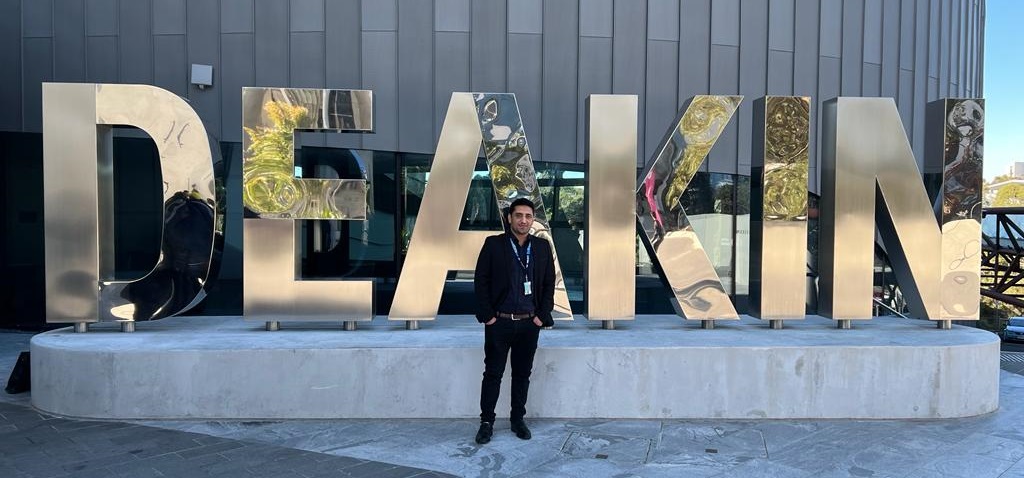 At Deakin University
At Deakin University